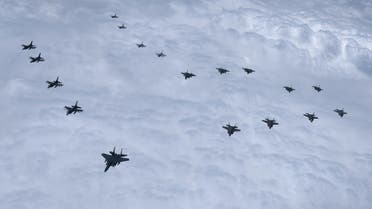
South Korean President Yoon Suk-yeol is dropping by the Pentagon this afternoon for discussions with Defense Secretary Lloyd Austin and others. That's expected around 3:30 p.m. ET, and neither Austin nor Yoon are expected to speak to reporters.
Yoon and President Joe Biden upgraded their two countries' nuclear defense plans in a joint agreement known as the "Washington Declaration," released Wednesday by the White House. The deal permits the U.S. Navy to periodically deploy a nuclear-armed submarine off the Korean coast in exchange for Seoul agreeing to not create or obtain its own nuclear weapons. 
The deal marks 70 years of the U.S.-South Korean alliance, and reaffirms "that any nuclear attack by the [North] against the [South Korea] will be met with a swift, overwhelming and decisive response," according to the text of the declaration. It also allows RoK officials to play a part in U.S. nuclear contingency planning for the peninsula, under the rubric of a "Nuclear Consultative Group," should North Korea carry out a nuclear attack. The additional measures include "a new table-top exercise conducted with U.S. Strategic Command," which oversees America's nuclear weapons and assets around the world.
One wonk's reax: "South Korea joins a small club of countries who used the mere threat of acquiring atomic weapons to wrest concessions from the United States," said Tristan Anderson Volpe of the Naval Postgraduate School in Monterrey, writing Wednesday on Twitter. "This strategy is not new," he notes. "During the Cold War, for example, West Germany used investments in nuclear energy technology to put pressure on Washington for stronger security commitments." Volpe elaborates further, here.
Reminder: North Korea set an annual record for missile tests last year, and it's expected to carry out its next nuclear weapons test—Pyongyang's seventh—at any point in the coming weeks, as Ankit Panda of the Carnegie Endowment for World Peace noted Wednesday on Twitter.
"Sustainable peace on the Korean Peninsula does not happen automatically," Yoon told reporters Wednesday while standing beside Biden in the Rose Garden. "Our two leaders have decided to significantly strengthen extended deterrence of our two countries against North Korea's nuclear and missile threats so that we can achieve peace through the superiority of overwhelming forces and not a false peace based on the goodwill of the other side," he said.  "I have absolute authority as Commander-in-Chief and the sole authority to use a nuclear weapon," Biden reminded reporters Wednesday in the Rose Garden. "But, you know, what the declaration means is that we're going [to] make every effort to consult with our allies when it's appropriate." He then stressed, "we're not going to be stationing nuclear weapons on the Peninsula; but we will have port visits of nuclear submarines and things like that. We are not walking away from that."
"I have absolute authority as Commander-in-Chief and the sole authority to use a nuclear weapon," Biden reminded reporters Wednesday in the Rose Garden. "But, you know, what the declaration means is that we're going [to] make every effort to consult with our allies when it's appropriate." He then stressed, "we're not going to be stationing nuclear weapons on the Peninsula; but we will have port visits of nuclear submarines and things like that. We are not walking away from that."
"Look, a nuclear attack by North Korea against the United States or its allies or partners is unacceptable," Biden said, "and will result in the end of whatever regime, were it to take such an action."
Not everyone in South Korea was pleased with the declaration. That includes the country's right-leaning conservative newspaper Chosun, which published an op-ed Thursday criticizing the agreement for not going far enough. "[I]t seems [the] U.S. is more worried about [South Korean] nuclear development than about neutralizing/incapacitating [North Korean] nukes," the paper's editors write. Jeongmin Kim of NKNews unpacks a bit more of the apparent anger in that op-ed, writing on Twitter Thursday.
One last thing: President Yoon surprised his audience at the White House Wednesday evening with an impromptu rendition of what he said was his favorite song, "American Pie," by Don McLean. The Associated Press preserved the moment in video, posted to YouTube.




No comments:
Post a Comment
Note: Only a member of this blog may post a comment.